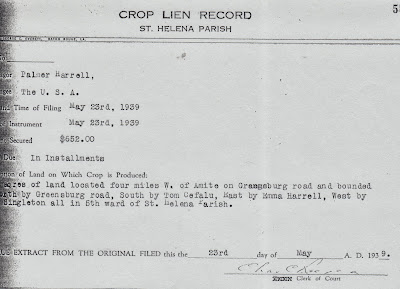 |
| Kneeling down: Antoinette, Thomas, Michael and Reginald Standing: Right to Left-Palmer Harrell, Bertha Harrell, |
My brothers and I enjoyed growing up in Amite, Louisiana. We played all day on Emma Mead Harrell's twenty acres of land in 1896 and 1902, which she purchased for herself and all her heirs. My maternal grandfather Jasper Harrell, Sr., was the youngest of his siblings. It was decided by my grandfather that he would raise his family right there on the land. Often, my mother told me, he would walk the land thinking and meditating.
A blacktopped road divided the land, so he decided to build his house across the road from his mother's.All kinds of fruit trees grew on the land, including fig trees, peach trees, lemon trees, pecan trees, walnut trees, plum trees and pear trees. On those hot summer days, Reginald, Thomas, and Michael and I would walk across the road to pick plums and peaches. The fresh plums and peaches were just a special treat. Whenever we got thirsty, we would pump out some of the most delicious water from the old water pump. We also had access to a water spring that provided cold water to cool us off. There was red clay dirt where we lived, and we used to play in the dirt until it stained our clothes. We would pretend to be mountain climbers. Our patience was put to the test as we waited patiently for the slow-moving beat-up green truck of my great Uncle Palmer to arrive. Finally, our uncle "Palmer" arrived and we walked with him across the street. We would help him pick the beans and other vegetables he planted.
We enjoyed his company and he enjoyed our company as well. With our help, he filled the hampers to the brim with snap beans, butter beans, purple hub peas, cucumbers, and squash. We always came home with fresh produce for our mother to cook for dinner, both white and yellow. We all enjoyed his company and he enjoyed our company as well. With our help, he filled the hampers to the brims with snap beans, butter beans, purple hub peas, cucumbers, and squash. We always came home with fresh produce for our mother to cook for dinner, both white and yellow.
When you know what the land has provided for you, you have a special attachment to it. Having learned the history of the land and how hard my great grandmother Emma Mead Harrell worked to buy it for her heirs, it is very difficult for me to stand by and allow someone to misuse it.

